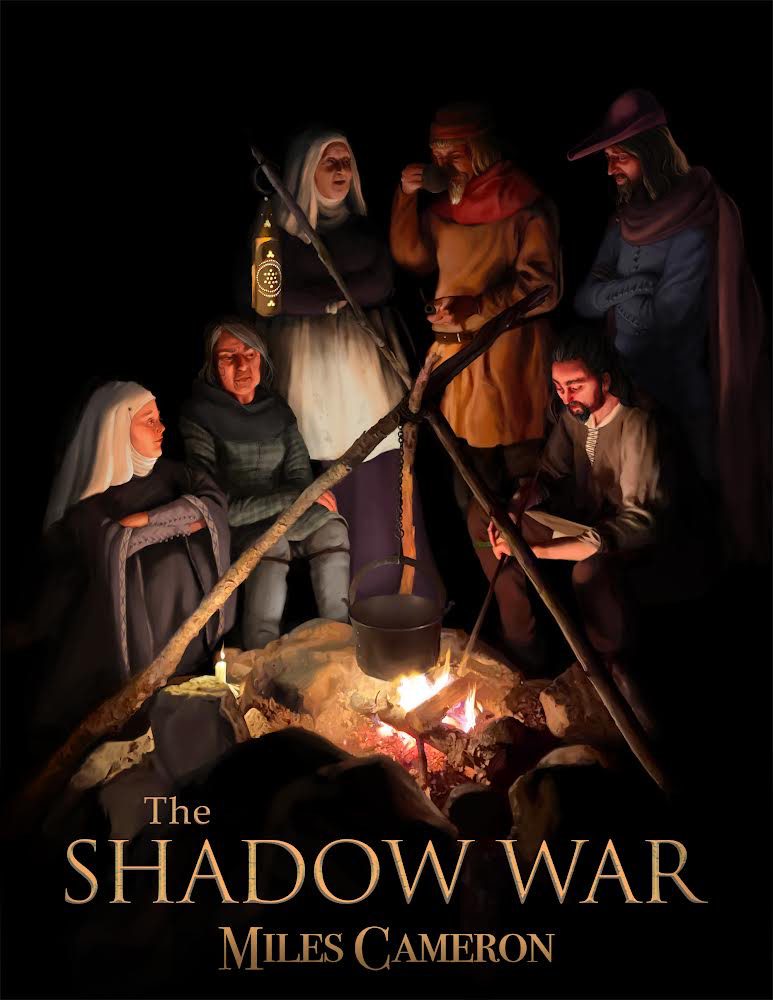
Every summer since I was thirty years old, I’ve gone with a group of friends (like minded nutters) into the wilderness of the Adirondacks in kit. Until. 2010, it was always 18th century kit; the period of the American Revolution. Since 2013, it has always been Medieval kit; the period just exactly four hundred years earlier (1375 to 1400 ish).
Living in the past, and traveling, and camping is an experience chock-full of compromise. North America isn’t remotely like Europe in some important ways, and while we can, if we work at it, imagine scenarios in which a handful of hardy companions take boats to travel for seven days, most of those scenarios would play out on pilgrimages on the Rhine, or trips on the Danube, and would often be in much larger boats. Medieval travelers (like most First Nations people in North America) had villages in which to stay; it would be very rare for travelers to have to camp or build shelters. As you can see in the photos, we trekkers use Kevlar boats and we often use other modernities, too; a gravity bag water filter, for example.

So, for the rest of this article, you can sneer all you like; the water is clean, and the boats are modern, although they don’t really offend the eye and they don’t require repair. But… the skills are still there. The skills of organization; when you travel a hundred miles in the 14th century, you need food, and places to sleep, firewood, drinking water, at well as your kit. Getting firewood is itself a job taking hours, even for ten or fifteen people; cook fires are demanding, and night watch is real. The organization of the food for a week in the woods is itself a job; woe betide the group that runs short of food.

Of course, cutting wood is a skill (see last blog) and this trip it developed an experimental archaeology side, as some skilled people decided to experiment with splitting logs with wooden wedges. Why would that matter? (Because that’s how it was done in Medieval Europe, but let’s leave that aside). Because if you can split with wooden wedges, that mean all you need to take into the woods is an axe. With the axe you cut a small hardwood tree and make a mallet and some wedges. After that, the axe only cuts trees. The wooden wedges do the rest. My friends Len Heidebrecht and Rob Gallasch have all the skills; they built the mallet and wedges, and split the wood.

Nifty. I had no idea. Really.
Another of the most interesting facets of living and traveling in the wild with the tools of the past, at least to a writer, is about time. There’s not enough. If you rise at dawn, there’s about enough daylight in August to cook a hasty breakfast, pack in the first light, move about ten miles, unpack and make camp, find wood, cook dinner, and go to sleep.
That’s what you did. All day. Sure, there’s time to play a game of cards (14th c. cards) or dice; to savour your half cup of wine (apparently we’re rich pilgrims) or to sew. But there’s very little time to think about ‘real life’ which may have something to say about why this is vacation, even if it is physically demanding.

Did I mention children? This isn’t a SpecOps exercise. This is the real world. Even Medieval armies were full of children, and these weeks in the woods don’t require us to be ‘tough.’ Tough is foolish. These weeks require us to have skills and organization and to use them. Children also learn amazing things about reliance and safety and the world. Just sayin’.
Did I mention sewing? Because within a day of starting, you have things that need repair. Clothes need repair, food bags need repair, the filthy bags that keep the pots off the rest of your things need repair. Your knife needs a new sheath (mine did) or you need to finish something (I was making a jupon). The Devil makes work for idle hands. Actually, the Devil is nowhere to be found, because everyone is working so hard.
Days develop a rhythm. It gets easier (I’ve done this 24 times) and everyone gets better at the packing and unpacking, at making shelters, at cooking as a team. At being a team. Life in the past is relentlessly collective; living in the Wild by yourself (beloved of fantasy novelists from Tolkien on) is brutally hard (in the past), and if you are hunting your food as well as camping and defending that food, I really question how long you’d live well by yourself. It’s been done. It’s just not conducive to having spare time for saving the world or prosecuting a war against evil. Better in a group, like Beren and his companions, or Tolkien’s dwarves, or the Fellowship; Tolkien had definitely done some living in the Wild; he had some excellent notions about firewood and water and important things.
It is good to be in a group because groups offer rest and security. There’s lots of work; we skip boat repair, but I’ve done three of these with period boats and they have lives of their own, with rotting timbers, leaks, bad construction and lengthy repairs (usually in the rain).
It’s good to be in a group because bears and coyotes are real; they are very, very unlikely to attack even a lone person, but very interested in taking your food. And of course, a lot of good writing about monsters comes from listening to something not as big as a small child thrash around in the woods fifty feet away in the full dark of a moonless night; it is remarkable how the intellectual knowledge that you are in no danger whatsoever does not calm the mammalian hind brain at all.
There’s so much work that people are tired, and tired people in groups can be trouble. This is actually what leadership is all about; it is very different from ‘reenacting’ because its not about fake stress and fake war; it’s about food and sleep and equitable distribution of labour, about whether one person really did take another’s seat; whether people will accept peer pressure to do work, or will need to be led, or pushed. I have camped with large groups with no leader and no chain of command. Very ‘dramatic.’ Almost never clear cut, or good vs. evil. At all.
To a writer, this is all grist for the mill. Motivation, character, the formation of character, character change and growth…its all there. Adventure, reaction to adventure; triumph, and even a little tragedy (but thankfully not too much).
It is my favorite reenacting activity. No test of arms, no armizare, no fencing match, no reenactment battle, no matter how adrenaline-filled or elaborate, can compete with living in the Wild with a group. Ultimately, it is the greatest feeder of my writing; it is, perhaps, my favorite activity (that is, for two weeks a year. )
And of course when it is over, it is like coming off a fast; everything is new again. Cities are extremely annoying; you’ve actually had quiet for weeks. People seem rude, because your small clan was courteous. Radio, television, and the internet are…. boring. And intrusive. And loud. On the other hand… hot water from a tap is luxurious; showers are lovely, and good food delicious.

A glance at this picture reminds me that I forgot to mention laundry. Right; no one likes to be filthy; Medieval people were not dirty. We do laundry. In period. Ah, the adventure.
This trip, we saw deer and wild turkeys; we caught fish and ate them; we survived a storm on a lake and we made some snug camps that stood off wind and rain showers. It was brilliant.
And next year we’ll do it all again. And I’ll write about it.



It comforts me to know that you didn’t start doing this until 30. I still have time! Are ardent readers allowed to join?
Yes. We are always recruiting. Never enough nutters… 🙂
Reblogged this on parmenionbooks.
Interesting post as always… the need to do things … as they were done… or to our best understanding of what that is … is vital… imo…. as such I’m a little dissapoijted in the use of modern water filtration.. after all what’s medieval travelling without a dose of dysentery… 😉
The idea of being able to function with what you can carry or what you can utilise is what makes us… there is a blog of a fellow who does that.. the first video in saw was him finding the materials to make the tools he used to make the other tools that make the camp etc…
It also reminds me of an old black smith I knew.. he told of how as an apprentice he was expected to make his own forge tools… and this has gone on master and apprentice back and back… no books nothings written just skill demonstrated, mimicked, mastered and passed on…
On one of our earliest outings, a young man got dysentery. The rest of us did not. We had to carry him. This was NOT fun.
Ah… ok… then I’ll let you off 😉
Sometimes it is about safety first. My 8 year old was on this trip and wore a modern life jacket while in the canoe. I did not want to put her at risk for the sake of being period. Ditto with water filtration.
Yes. Very much so.
And lets not forget musicians. In the past the only way you could listen to music was to actually make it- with living humans. No rafio, no recordings, no ipod, no itunes. And you would have to carry your instruments, or make them out of things around you. Luckily, your voice comes ready made and built in.
In fact, music is perhaps the very best way of experiencing the intellectual life of the past without intermediaries… so true, Stephanie!